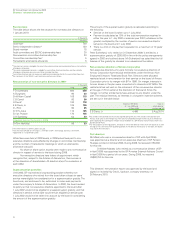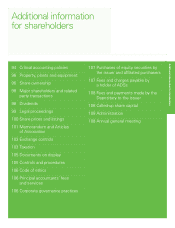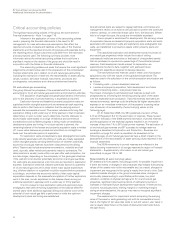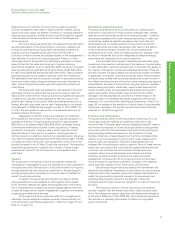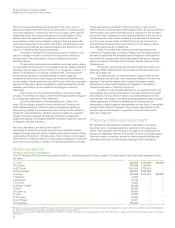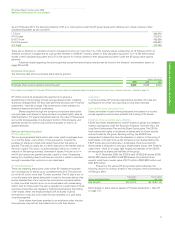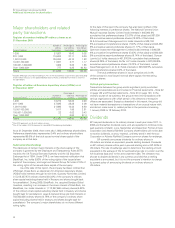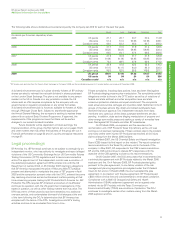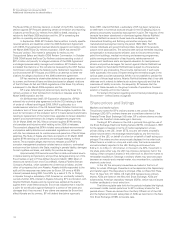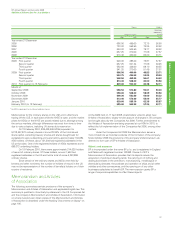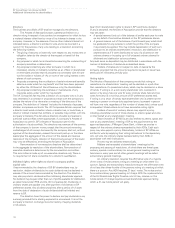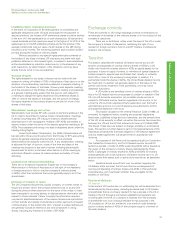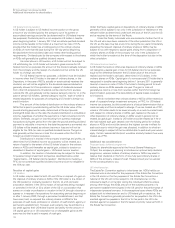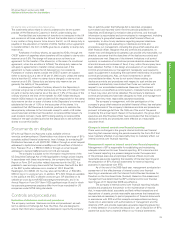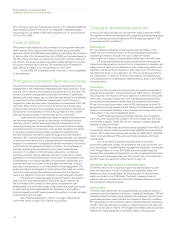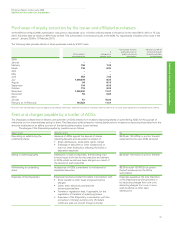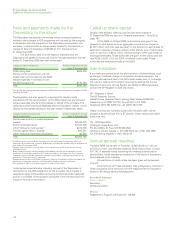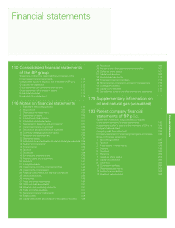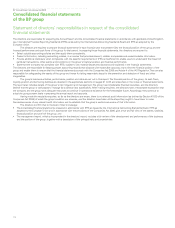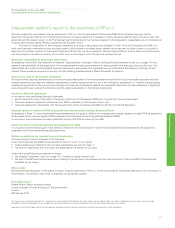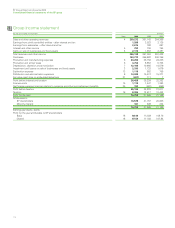BP 2009 Annual Report Download - page 104
Download and view the complete annual report
Please find page 104 of the 2009 BP annual report below. You can navigate through the pages in the report by either clicking on the pages listed below, or by using the keyword search tool below to find specific information within the annual report.
102
BP Annual Report and Accounts 2009
Additional information for shareholders
Directors
The business and affairs of BP shall be managed by the directors.
The Articles of Association place a general prohibition on a
director voting in respect of any contract or arrangement in which he has
a material interest other than by virtue of his interest in shares in the
company. However, in the absence of some other material interest not
indicated below, a director is entitled to vote and to be counted in a
quorum for the purpose of any vote relating to a resolution concerning
the following matters:
• The giving of security or indemnity with respect to any money lent or
obligation taken by the director at the request or benefit of the
company.
• Any proposal in which he is interested concerning the underwriting of
company securities or debentures.
• Any proposal concerning any other company in which he is
interested, directly or indirectly (whether as an officer or shareholder
or otherwise) provided that he and persons connected with him are
not the holder or holders of 1% or more of the voting interest in the
shares of such company.
• Proposals concerning the modification of certain retirement benefits
schemes under which he may benefit and that have been approved
by either the UK Board of Inland Revenue or by the shareholders.
• Any proposal concerning the purchase or maintenance of any
insurance policy under which he may benefit.
The UK Companies Act requires a director of a company who is in any
way interested in a contract or proposed contract with the company to
declare the nature of his interest at a meeting of the directors of the
company. The definition of ‘interest’ includes the interests of spouses,
children, companies and trusts. The UK Companies Act also requires that
a director must avoid a situation where a director has, or could have, a
direct or indirect interest that conflicts, or possibly may conflict, with the
company’s interests. The Act allows directors of public companies to
authorize such conflicts where appropriate, if a company’s Articles of
Association so permit. BP’s Articles of Association permit the
authorization of such conflicts. The directors may exercise all the powers
of the company to borrow money, except that the amount remaining
undischarged of all moneys borrowed by the company shall not, without
approval of the shareholders, exceed the amount paid up on the share
capital plus the aggregate of the amount of the capital and revenue
reserves of the company. Variation of the borrowing power of the board
may only be effected by amending the Articles of Association.
Remuneration of non-executive directors shall be determined
in the aggregate by resolution of the shareholders. Remuneration of
executive directors is determined by the remuneration committee.
This committee is made up of non-executive directors only. There is
no requirement of share ownership for a director’s qualification.
Dividend rights; other rights to share in company profits;
capital calls
If recommended by the directors of BP, BP shareholders may, by
resolution, declare dividends but no such dividend may be declared in
excess of the amount recommended by the directors. The directors
may also pay interim dividends without obtaining shareholder approval.
No dividend may be paid other than out of profits available for distribution,
as determined under IFRS and the UK Companies Act. Dividends on
ordinary shares are payable only after payment of dividends on BP
preference shares. Any dividend unclaimed after a period of 12 years
from the date of declaration of such dividend shall be forfeited and
reverts to BP.
The directors have the power to declare and pay dividends in any
currency provided that a sterling equivalent is announced. It is not the
company’s intention to change its current policy of paying dividends
in US dollars.
Apart from shareholders’ rights to share in BP’s profits by dividend
(if any is declared), the Articles of Association provide that the directors
may set aside:
• A special reserve fund out of the balance of profits each year to make
up any deficit of cumulative dividend on the BP preference shares.
• A general reserve out of the balance of profits each year, which shall
be applicable for any purpose to which the profits of the company
may properly be applied. This may include capitalization of such sum,
pursuant to an ordinary shareholders’ resolution, and distribution to
shareholders as if it were distributed by way of a dividend on the
ordinary shares or in paying up in full unissued ordinary shares for
allotment and distribution as bonus shares.
Any such sums so deposited may be distributed in accordance with the
manner of distribution of dividends as described above.
Holders of shares are not subject to calls on capital by the
company, provided that the amounts required to be paid on issue have
been paid off. All shares are fully paid.
Voting rights
The Articles of Association of the company provide that voting on
resolutions at a shareholders’ meeting will be decided on a poll other
than resolutions of a procedural nature, which may be decided on a show
of hands. If voting is on a poll, every shareholder who is present in
person or by proxy has one vote for every ordinary share held and two
votes for every £5 in nominal amount of BP preference shares held.
If voting is on a show of hands, each shareholder who is present at the
meeting in person or whose duly appointed proxy is present in person
will have one vote, regardless of the number of shares held, unless a poll
is requested. Shareholders do not have cumulative voting rights.
Holders of record of ordinary shares may appoint a proxy,
including a beneficial owner of those shares, to attend, speak and vote
on their behalf at any shareholders’ meeting.
Record holders of BP ADSs are also entitled to attend, speak and
vote at any shareholders’ meeting of BP by the appointment by the
approved depositary, JPMorgan Chase Bank, of them as proxies in
respect of the ordinary shares represented by their ADSs. Each such
proxy may also appoint a proxy. Alternatively, holders of BP ADSs are
entitled to vote by supplying their voting instructions to the depositary,
who will vote the ordinary shares represented by their ADSs in
accordance with their instructions.
Proxies may be delivered electronically.
Matters are transacted at shareholders’ meetings by the
proposing and passing of resolutions, of which there are three types:
ordinary, special or extraordinary. An annual general meeting must be
held once in every year and all other general meetings will be called
extraordinary general meetings.
An ordinary resolution requires the affirmative vote of a majority
of the votes of those persons voting at a meeting at which there is a
quorum. Special and extraordinary resolutions require the affirmative vote
of not less than three-fourths of the persons voting at a meeting at which
there is a quorum. Any AGM requires 21 days’ notice. The notice period
for an extraordinary general meeting is 14 days. With the implementation
of the EU Shareholder Rights Directive into UK law, reliance on this
notice period of 14 days requires annual shareholder approval, failing
which, a 21-day notice period will apply.


